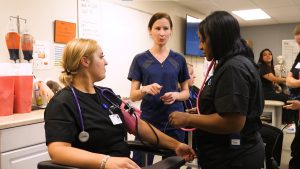Medical Assistant Specializations
July 13, 2015
According to the Bureau of Labor Statistics (BLS) , the number of medical assisting jobs is projected to grow 29% from 2012 to 2022, making it one of the fastest growing job titles in health care. One of the reasons demand is rising so quickly is because Americans prefer to be treated by a specialist whenever possible. As a result, there are plenty of medical assistant specializations to choose from.
What do medical assistants do?
A medical assistant’s responsibilities may vary depending upon the health care provider for which they work. For instance, assistants at large organizations may specialize in administrative or clinical tasks, but in small, private medical practices, assistants often have dual responsibilities. Some of these tasks may include:
- Assisting the physician with patient examinations
- Giving injections as directed by the physician
- Measuring patient’s vital signs
- Preparing blood and other specimens for laboratory tests
- Scheduling patient appointments
- Taking and recording patient history and personal information
Specializations medical assistants should consider
No matter which path you choose to take in your medical assisting career, we have the program for you. The training you’ll receive at First Institute can prepare you with the skills you need to become a valuable member of a health care team.
Chiropractic practices
Chiropractors use a holistic approach in caring for the human body. To assist them, Medical assistants may perform front office duties such as making appointments and handling insurance claims. Medical assistants may also assist the chiropractor with treatments.
Obstetrics / Gynecology
Obstetricians and gynecologists specialize in women’s reproductive health. For these specialists, medical assistants assist in procedures, take patient histories and schedule appointments.
Ophthalmology
Ophthalmology medical assistants provide a wide range of duties in caring for the eyes. You can expect to perform testing on patients, take patient history, and sometimes measure basic vital signs like blood pressure and pulse.
Phlebotomist
If you don’t mind blood and needles, working at a local blood bank, hospital, or lab offers a great opportunity for medical assistants. Phlebotomists draw blood and prepare samples for testing.
Podiatry
Podiatry focuses on injuries and medical conditions of the foot. Medical assistants are responsible for trimming nails, providing wound and post-surgical care, assisting with splints and casts, and assisting in minor surgery.
Get the training you need for a medical assisting career.
As a medical assistant, you’ll have the opportunity to impact the lives of many patients. If you are interested in a rewarding career in the growing health care industry and would like to know more about First Institute’s Medical Assisting Program, call 815-459-3500
More on Medical Assisting Careers:


